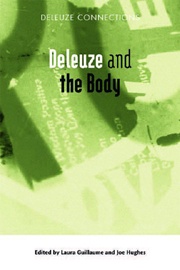Book contents
- Frontmatter
- Contents
- Introduction: Pity the Meat?: Deleuze and the Body
- DELEUZISM
- PRACTICAL DELEUZISM
- 6 The ‘Virtual’ Body and the Strange Persistence of the Flesh: Deleuze, Cyberspace and the Posthuman
- 7 ‘Be(come) Yourself only Better’: Self-transformation and the Materialisation of Images
- 8 An Ethico-Aesthetics of Heroin Chic: Art, Cliché and Capitalism
- 9 Multi-Dimensional Modifications
- 10 Dance and the Passing Moment: Deleuze's Nietzsche
- Notes on Contributors
- Index
6 - The ‘Virtual’ Body and the Strange Persistence of the Flesh: Deleuze, Cyberspace and the Posthuman
from PRACTICAL DELEUZISM
Published online by Cambridge University Press: 12 September 2012
- Frontmatter
- Contents
- Introduction: Pity the Meat?: Deleuze and the Body
- DELEUZISM
- PRACTICAL DELEUZISM
- 6 The ‘Virtual’ Body and the Strange Persistence of the Flesh: Deleuze, Cyberspace and the Posthuman
- 7 ‘Be(come) Yourself only Better’: Self-transformation and the Materialisation of Images
- 8 An Ethico-Aesthetics of Heroin Chic: Art, Cliché and Capitalism
- 9 Multi-Dimensional Modifications
- 10 Dance and the Passing Moment: Deleuze's Nietzsche
- Notes on Contributors
- Index
Summary
There is no doubt that Deleuze's work, particularly his joint work with Guattari, has inspired certain theorists of cyber culture. Wherever one looks in contemporary cyber discourse, one encounters Deleuze and Guattarian concepts, especially those of the rhizome, the minoritarian, the molecular, assemblages, and of course, becoming-machine. Neil Spiller has even hailed A Thousand Plateaus as ‘the philosophical bible of the cyber-evangelists’, and suggested that ‘this book is possibly one of the most quoted philosophical texts in connection with the technological “spacescape” that computers have created and augmented’ (Spiller 2002: 96). Via cyber theory, Deleuze and Guattarian concepts have entered the realm of popular techno-culture, as evidenced by the New Museum's adoption of ‘www.rhizome.org’ as the name for its program dedicated to supporting and preserving ‘emerging artistic practices that engage technology’.
While the link between Deleuze and Guattarian concepts, cyber theory and internet-related technologies may seem self-evident to some, it is not without its tensions. As John Marks has noted, Deleuze himself was not a ‘cybertheorist’ (Marks 1998: 48). Indeed, Deleuze's few comments on ‘information technologies’ and their relation to emerging ‘control societies’ are primarily negative (Deleuze 1995: 175, 177–82). As Marks wisely suggests, while Deleuze's work with Guattari offers many ideas that speak to cyber theory, it also contains others that make it potentially critical of cyber theories (Marks 2006: 195). This is particularly the case, I would argue, when we consider Deleuze's work as a whole, especially his rejection of transcendent thinking and his ontological critique of representation.
- Type
- Chapter
- Information
- Deleuze and the Body , pp. 117 - 143Publisher: Edinburgh University PressPrint publication year: 2011



